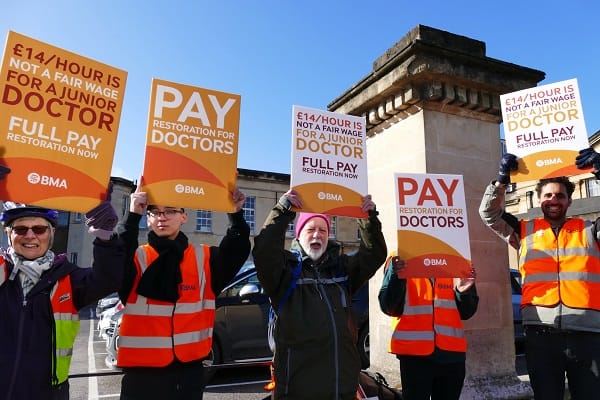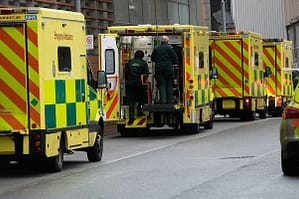The Academy of Medical Royal Colleges are calling on junior doctors to “rapidly engage with an independent organisation” to end the strikes and agree a way forward.
Medical chiefs fear that the British Medical Association (BMA) and the Royal College of Nursing (RCN) unions will co-ordinate strikes which will have a grave impact on the NHS.
RCN nurses are set to strike from 30 April to 2 May after a 5% pay deal was rejected and ambulance workers will strike with nurses on 2 May.
The BMA asked the government last week to enter facilitated talks with Acas, but Downing Street insisted there will be no talks unless junior doctors stop their 35% pay deal to end the strikes.
In a statement on Wednesday night, the Academy of Medical Royal Colleges said, “All colleges are keenly aware of the concerns and frustration of doctors throughout the NHS and the intense workload pressures they, along with other NHS professionals, are facing as a result of workforce shortages and as a legacy of the Covid-19 pandemic.
“These are issues which do need to be addressed as a matter of urgency and junior doctors have the support of the Academy and their own colleges in doing this.
“We urge both parties to engage swiftly and to enter negotiations with a commitment to work constructively and to offer flexibility.
“To this end both parties need to rapidly engage with an independent organisation to work out how the deadlock can be broken for the sake of patients and the wider NHS.”
The NHS national medical director Professor Sir Stephen Powis warned the strikes are having a “colossal impact” on care in the NHS.
He said, “Each of the 195,000 appointments postponed has an impact on the lives of individuals and their families and creates further pressure on services and on a tired workforce – and this is likely to be an underestimate of the impact as some areas provisionally avoided scheduling appointments for these strike days.
“Our staff now have an immense amount of work to catch up on hundreds of thousands of appointments, all while continuing to make progress on tackling the backlog of people who have been waiting the longest for treatment.
“We have now seen nearly half a million appointments rescheduled over the last five months, and with each strike, it becomes harder.
“While our staff are doing all they possibly can to manage the disruption, it is becoming increasingly difficult and the impact on patients and staff will unfortunately continue to worsen.”
Regarding all health strikes, he said: “Could the current lose-lose standoff have been avoided? By last autumn it was obvious that inflation was far higher than assumed by the independent NHS review bodies, so their original recommendations wouldn’t stick.
“At that point they could have been asked, exceptionally, to make an improved 18-month pay recommendation. That might have drawn the sting while preserving their legitimacy.
“Had it been coupled with the Government’s long-awaited NHS workforce plan to expand and reform training, frontline staff might have seen light at the end of tunnel.
“Now if further strikes drag on, at the very least waiting lists will worsen. The nuclear option of withdrawing cover for emergency services and urgent cancer care would be unconscionable.”





Leave a Comment